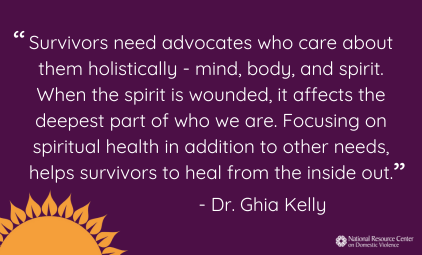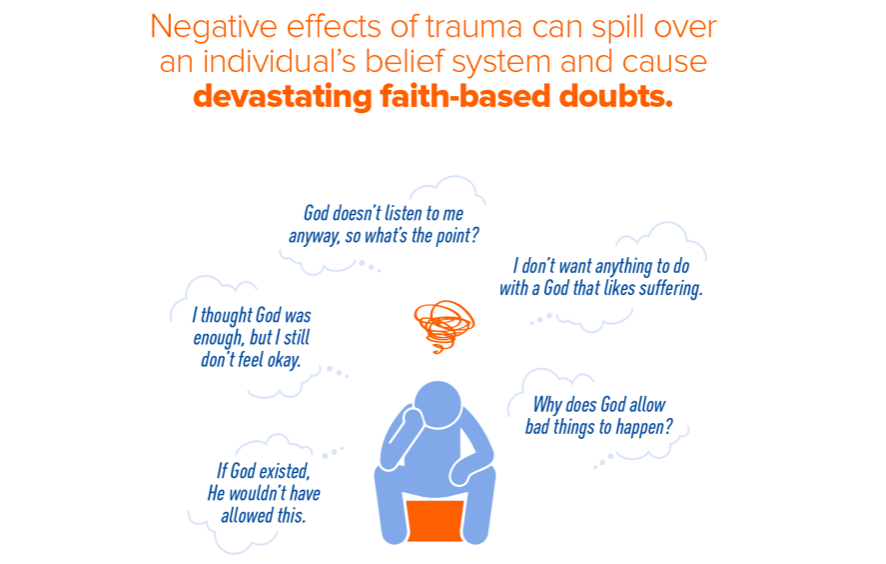“I’ve always believed in God, but during this turmoil, it was like God had abandoned me. And I come to find out, I come to realize God didn’t abandon me, I walked away from him. So it took from my pastor, the support from my family, to help me get where I am. I still have a ways to go, and I’m not going to stop ‘til I get there.” – Survivor (age 42)
A holistic approach to service provision recognizes that healing from abuse and trauma is a process and a journey that is unique to each survivor. It also acknowledges that the spirit of the trauma survivor – in additional to their physical and psychological health – needs attending to as well. Faith and spirituality can be instrumental in supporting the grieving and healing processes of domestic violence survivors. Research and practice alike have shed light on the ways in which faith and spirituality may help survivors rise above their suffering and/or view their trauma and life purpose in a new light.
This may be particularly true for survivors from traditionally marginalized communities. African American survivors, for instance, have often emphasized the centrality of spirituality in their lives and the role it plays in helping them overcome and cope with abuse and violence. Many survivors report finding hope and healing in the spiritual practices of their ancestors. Native survivors, for example, may wish to return to traditional, ancestral beliefs and ceremonies to support their healing journey in lieu of Eurocentric, mainstream approaches (Mending the Sacred Hoop, n.d.).
Advocates and service providers who are not religious or spiritual may struggle to grasp the centrality of religion in the lives of survivors of faith. In its publication, Why Faith Matters: Responding to Sexual Violence and Abuse, FaithTrust suggests that for non-religious advocates/providers, it may be helpful to think of a survivor’s spiritual life and practice as a form of self-care. Research has shown that the experience of awe can have beneficial psychological and physical implications and that prayer and meditation have proven psychological and physical benefits. For many, religious and spiritual practices and beliefs are a key to processing, recovering, and healing from trauma, and spiritual communities may be one place to seek support and guidance. “This concept doesn’t do justice to the fullness of someone’s spiritual life, but it may help bridge the understanding between someone who has a spiritual/religious life and someone who doesn’t” (FaithTrust, 2019).
Based on the understanding that “reconnection between one’s self and a higher power builds a strong foundation for a balanced life and purpose” (Mending the Sacred Hoop, n.d.), this section features information to assist both faith leaders and domestic violence advocates in supporting survivors who wish to mobilize, in their healing journey, resources that are rooted in their faith and spirituality.
"Women with abusive partners utilize a variety of coping strategies to deal with and heal from the violence and sense of betrayal they have experienced. For many women, their trust in a higher power and the support they receive from their faith community is integral to their healing. Of 151 women interviewed for a study, the majority (97%) noted that spirituality or God was a source of strength or comfort for them.” (Gillum, Sullivan & Bybee, 2006)

Spirituality is important to the holistic health of survivors and can be a critical component of a survivor’s healing journey.
For guidance on nurturing the spiritual well-being of survivors of intimate partner violence, check out NRCDV’s TA Guidance document, Spiritual Health Matters: Strategies for Supporting the Spiritual Wellbeing of Survivors of IPV, by Dr. Ghia Kelly (November 2023).

From Touched by Trauma: Your Lord Has Not Left You Alone by the Yaqeen Institute for Islamic Research









